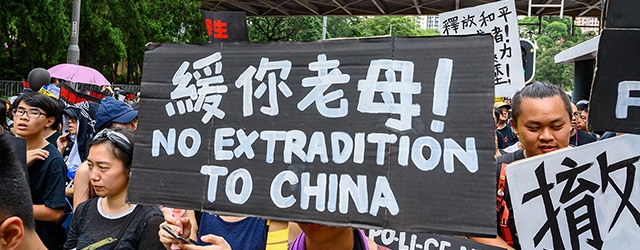Tensions over the proposed extradition treatydo not bode well for Hong Kong's future as a hub of international trade and finance.

After more than a week of violent protest in Hong Kong, the territory’s government was forced to shelve a controversial extradition bill that both angered citizens and alarmed businesses. So far, the retreat has done little quell protests or allay the fears of companies operating in the region.
Protests broke out earlier this month after the government of the former British colony proposed a new extradition bill that could mean citizens of Hong Kong and foreign nationals within the territory could be sent for trial in People’s Republic of China (PRC).
Hong Kong was returned to Chinese rule in 1997 under a “one country, two systems” arrangement that guarantees Hong Kong a degree of autonomy. Critics of the bill feared it would erode the Special Administrative Region’s judicial independence. This week, Hong Kong’s Beijing-backed leader Carrie Lam apologized for the controversy and promised to “indefinitely suspend” the bill. Notably, she did not withdraw the bill from consideration and protests have continued.
The American Chamber of Commerce (AmCham)in Hong Kong said the government should drop the bill to avoid “hurting the city’s rule of law and hard-earned competitiveness.”In an interview with the South China Morning Post last month, Tara Joseph, the president ofAmCham’s Hong Kong chapter, warned that pushing the bill through would risk “shooting Hong Kong in the foot.”
Steve Dickinson, an attorney with law firm Harris Bricken which specializes in corporate law in China, added that the protests, coupled with the growing integration of Hong Kong with the PRC, will likely push financial professional and multinational to other Asian hubs.
“Singapore will be the most likely beneficiary, but Bangkok, Taipei, Tokyo and Seoul will also benefit,” he tells Global Finance. “The PRC would like these folks to move to Shanghai. But recent actions on the part of the PRC government driving away expats of all types means that a move to Shanghai is not going to happen.”
If the bill is revived—as many fear it will be—Gary Hufbauer, an economist and non-resident senior fellow at the Peterson Institute for International Economics, says several countries could be affected. Ultimately, if the extradition law is enacted the impact on business will depend on the response of the US and other countries.
“If the response is sharp—for example repeal of the Hong Kong Policy Act [a 1992 act that allows the US to treat Hong Kong separately from China with regards to trade]—lots of financial firms will migrate to Singapore and other Asian centers,” says Hufbauer. “This would be a real blow to Hong Kong. There’s no reason for multinationals to expand investment in Hong Kong if it’s going to be caught up in the emerging cold war between the US and China.”
Hufbauer adds that China’s President Xi Jinping must essentially choose between benefits of foreign investment and making Hong Kong an integral part of the PRC. Dickinson meanwhile notes that Beijing’s long-term ambition is for cities like Shanghai to supplant Hong Kong as China’s primary hub for international business. “From the perspective of the PRC, the unrest serves that purpose,” he says. “On the other hand, the unrest shows long term that it may be difficult to fully integrate Hong Kong into the PRC.”
Hufbauer adds: “Other [Chinese] cities give Hong Kong competition for finance and high tech, but Hong Kong’s charm is its distance from Beijing’s regulatory sway. At the moment, that’s a big calling card.”



